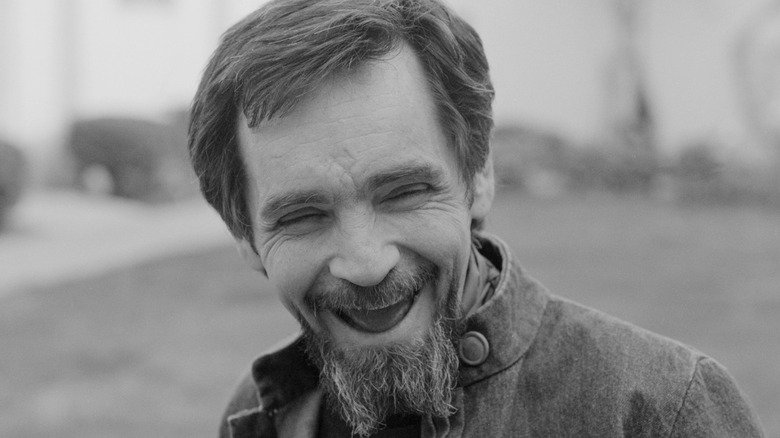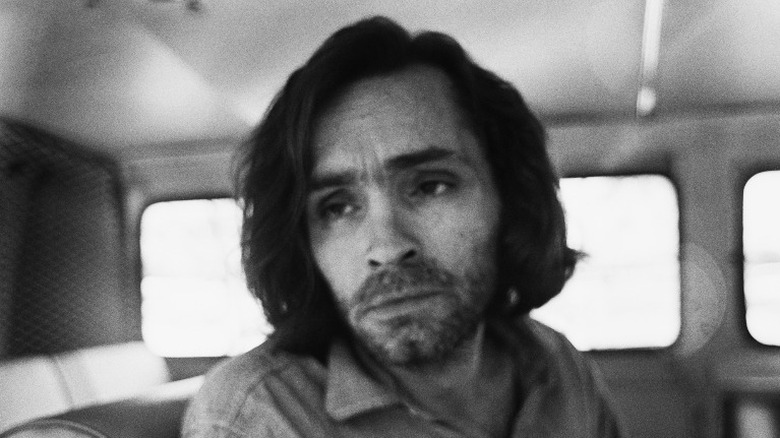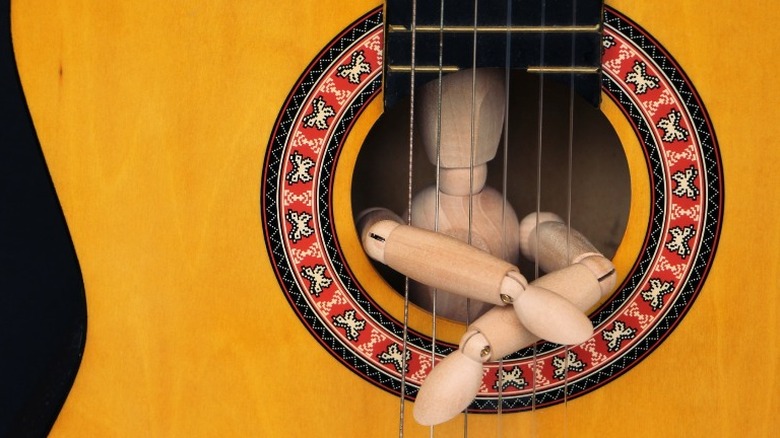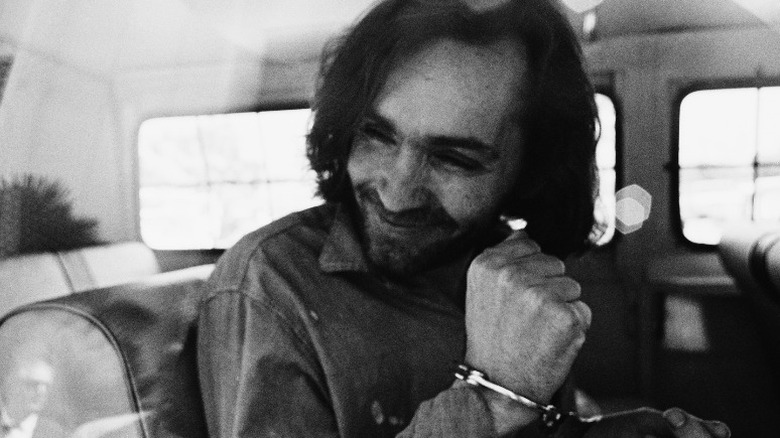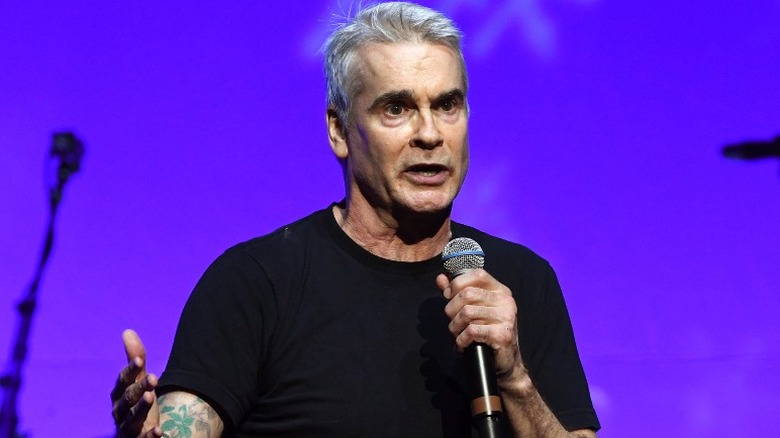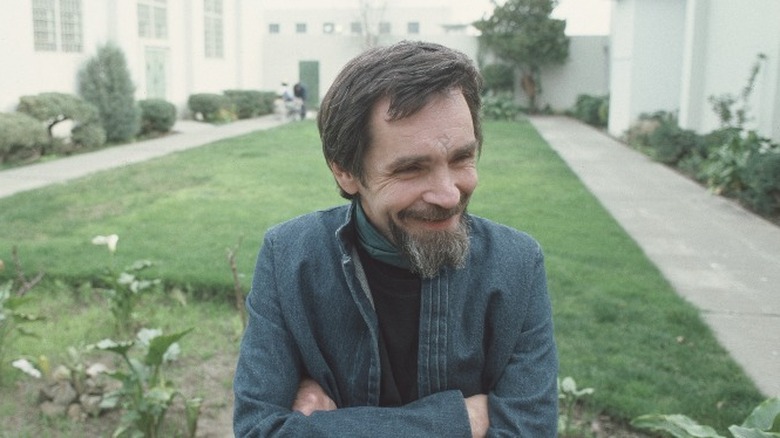How Charles Manson Released A Studio Album Despite Being In Prison
Most who find notorious cult leader Charles Manson worthy of study will have learned that the late killer was a budding musician whose ire against a record producer sparked a series of brutal murders across Los Angeles in the summer of 1969. Indeed, Manson was said to hold a grudge against music industry icon Terry Melcher, who had been initially interested in working with Manson's music but had soon lost interest (per The Guardian).
Melcher, who had a storied career before the 1969 Manson murders that included producing The Byrds and The Beach Boys, had lived in the home on Cielo Drive that Manson sent his squad of drug-crazed proxies to on August 8, 1969. Melcher had grown to fear Manson, whom he had met the year before, and had moved out of the home shortly before Manson's group attacked (per Investigation Discovery). The house was rented by director Roman Polanski and was occupied by Polanski's pregnant wife Sharon Tate the night of the murders. Tate, her unborn child, hairstylist Jay Sebring, coffee heiress Abigail Folger, Tate's friend Wojciech Frykowski, and Steven Parent were the Manson Family's carnage objects that evening.
Manson and four of his cult members were later arrested and incarcerated for the murders on Cielo Drive and the murders of Leno and Rosemary LaBianca one night later. Though the killings occurred more than 50 years ago, the ripple effect can still be felt all over Hollywood and beyond. Adding to the tragedy are the scores of songs Manson himself recorded over the years, many of which have been produced and professionally released.
LIE: The Love and Terror Cult
Though more known as a professional tour manager, working for big-name acts like The Rolling Stones and Emmy Lou Harris, Phil Kaufman more than dabbled in the field of record producing. His most notable — and most controversial — release was 1970s "Lie: The Love and Terror Cult." The album was a 14-track LP, with music recorded by Manson during separate recording sessions spanning from 1967 to 1968 (via The New Yorker). Kaufman released the album and limited it to only 2,000 pressings. It was a commercial failure, only selling a scant 300 copies (per All About Jazz).
Manson and Kaufman had become acquainted while the two were incarcerated together in prison in the mid-1960s while Kaufman was doing a stint for a marijuana charge (per The East Nashvillian). When Kaufman was later released, he hung out with Manson and his makeshift family at the Spahn Movie Ranch outside Los Angeles. Kaufman moved away before the Tate-LaBianca murders occurred.
What Kaufman could not have predicted at the time he was realizing his record was a failure was that it would have tracks that would be successfully covered by well-known musicians decades later. The most commercially successful cover of a Manson song from the Lie record was the track "Look at Your Game, Girl," which appeared on the 1993 Guns N' Roses album "The Spaghetti Incident" (per CBS News). Other bands that released covers from Lie include Rob Zombie, The Lemonheads, and Marilyn Manson (per Far Out Magazine).
Manson recorded an unknown amount of music while in prison
According to High Volume Music, Manson recorded regularly during the 1980s while he was incarcerated in prison. Known in some circles as "The Vacaville Tapes" after the prison medical facility he was being held in, these recordings were far from professionally made (per The Daily Republic). Manson recorded the music into different tape recorders provided by prison staff. The tapes, whose number remains unknown, were then sent out into the world and the hands of various associates.
Over the years, dozens of bootleg recordings of these Manson songs have surfaced. What they lack in quality they make up for as a curiosity, however. The failed musician who once had an audience with music greats Mama Cass Elliot, Neil Young, Dennis Wilson, and others, was doomed to make music behind prison walls for the rest of his life instead of playing professionally alongside people that Manson regarded as his contemporaries (via The Brag). Over time, these low-quality prison recordings would catch the attention of someone who would gather what were perceived as the best ones and release them on a single LP decades after they were originally recorded.
The release of F****** Around
Manuel Vasquez is not a professional record producer by any means. But when he was 26, Vasquez took his hobby of music production on a morbid turn. Vazquez, who was intrigued by Manson since his early teens, began writing to the cult leader in prison. The two men struck up a pen-pal relationship, prompting Vasquez to take an interest in the environmental causes that Manson purported to believe in (via The Los Angeles Times).
Vazquez was interested in releasing an LP on Manson's behalf, and after a successful Kickstarter campaign that raised thousands of dollars, he was able to do so. In a pressing that was limited to only 500 copies, Vazquez debuted "F****** Around" in 2012, quickly selling nearly 200 copies out of the boutique he runs. For the sale price of $18, you could have bought this limited-edition vinyl record that featured artwork by Manson himself on the back cover, paired with a drawing of Manson made by a fellow inmate for the album's front.
The news source reports that nearly two dozen cassettes and records have been released with Manson's music since he first started recording his music in Vacaville. What makes this album so unique is that none of the tracks had ever been released before. Vazques claims that the entire album was taken from a cassette that Manson had sent to someone outside of prison, who then gave it to another party. Vazquez was able to secure this cassette from that recipient, later being able to successfully produce a full-length record from its contents.
Henry Rollins once produced an album for Manson
What many punk fans might be shocked to learn was that former Black Flag frontman Henry Rollins produced an album of Manson's Vacaville recorded songs that were very nearly released. The Guardian reports that in 1984, Manson and Rollins began corresponding with each other through the mail. Manson wrote first, penning to Rollins that he had seen him on MTV and was a fan. Rollins and Manson exchanged several letters back and forth before an attorney representing Manson approached Rollins and his label, SST Records, about producing Manson's album of prison songs.
According to Spinner, Rollins recalled the series of events to the audience at a fundraiser for not-for-profit LA radio station KCRW. After playing one of Manson's songs for the crowd, Rollins begins telling the tale of how he was asked by Manson's attorney for help with the record, to which he agreed.
But the record only got as far as the test pressing phase. After receiving multiple death threats, SST Records decided to drop the project. There were only five test pressings of the record manufactured. The news outlet reported that Rollins kept two for himself and sent the other three to Manson in prison.
Various German labels have released Manson's music
The release of Manson's music hasn't been limited to the United States. There have been several European labels that have capitalized on the Manson name and have used it as a gimmick to sell LPs and CDs over the years. Securing some of the various recordings that Manson made while incarcerated at Vacaville during the 1980s, German music label Remote Control Records released a limited 555 copy run of Poor Old Prisoner Boy (per Discogs).
Elsewhere in Germany, the label Neue Ästhetik released four albums with Manson as the centerpiece. Beginning with "The Manson Family Jams" in 2009, Neue Asthetik went on to release three more Manson records in the next seven years. They include "Songs from the Sick" (2012), "The Hallways of Always" (2012), and "The Way of the Wolf" (2016). This label's release of Manson's music was largely remastered versions of previously released music by Manson, ranging from his 1967 recordings to the sessions he played while in Vacaville (via Discogs).
